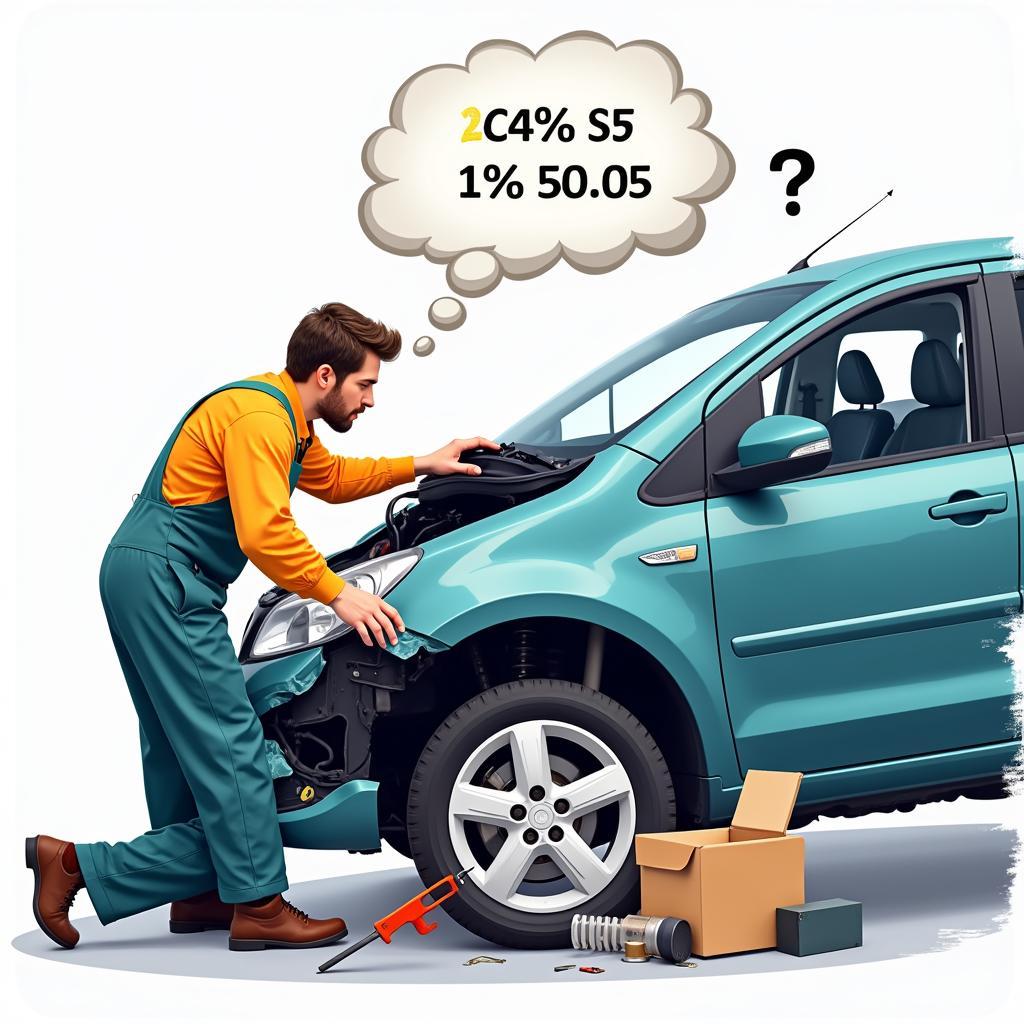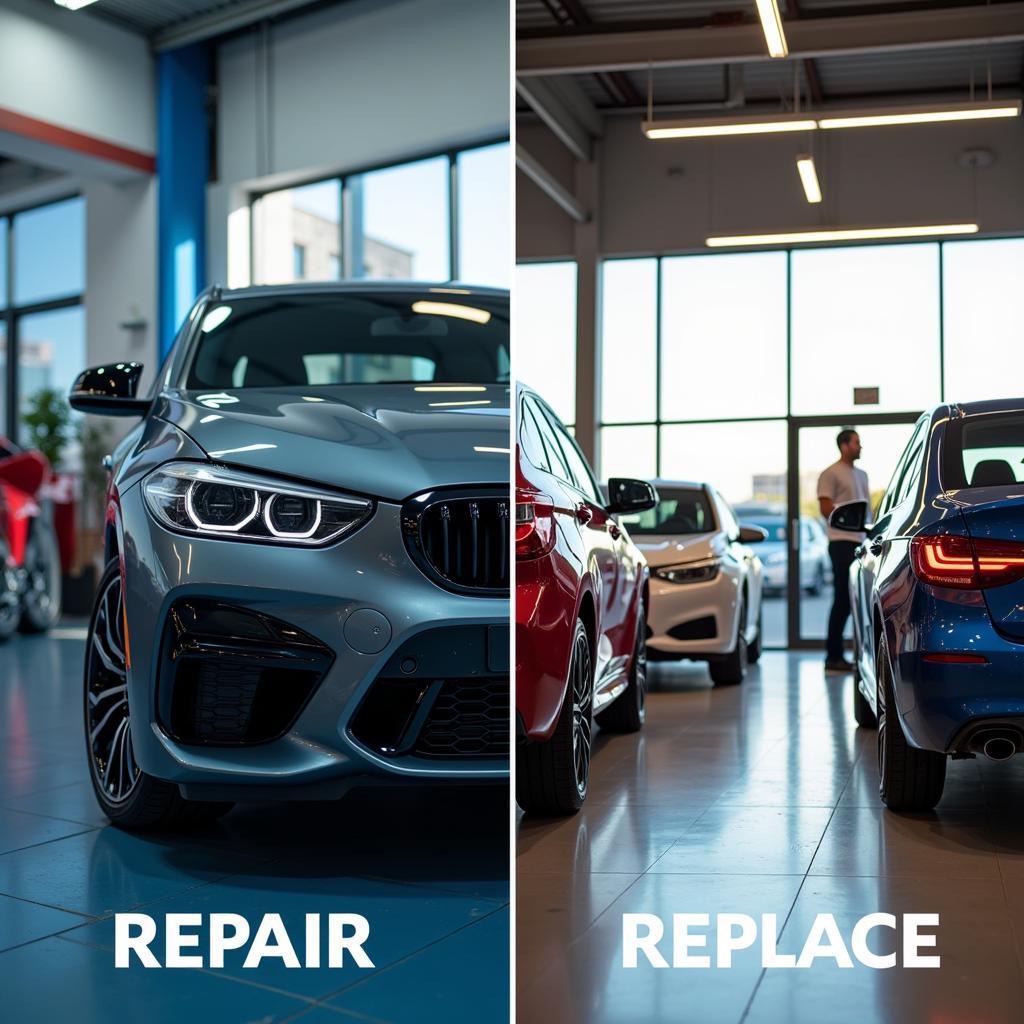When faced with a hefty car repair bill, the question “fix car if costs more than it’s worth?” becomes a critical dilemma. Determining whether to repair or replace your vehicle involves careful consideration of several factors, not just the immediate cost of repairs. This guide will navigate you through the decision-making process, offering expert advice to help you make the best choice for your situation.
Repairing a vehicle that exceeds its market value can seem counterintuitive. However, several factors can influence this decision, such as the car’s sentimental value, its overall condition (excluding the current damage), and the availability and cost of replacement vehicles. It’s essential to assess the situation holistically rather than focusing solely on the repair estimate. What seems like a costly repair might be more economical than purchasing a new or used vehicle in the current market.
Assessing the Damage: Is Fixing Your Car Worth the Cost?
Before making any decisions, thoroughly assess the damage. Obtain multiple repair quotes from reputable mechanics. Compare these quotes and ask questions about the extent of the damage and the necessary repairs. A detailed understanding of the problem can help you determine if the cost is justified. Is the damage primarily cosmetic, or does it affect the car’s core functionality and safety?
 Car Damage Assessment and Repair Cost
Car Damage Assessment and Repair Cost
For instance, a minor dent might be less expensive to repair than replacing the entire panel, especially if the car is otherwise in good condition. However, if the damage involves critical components like the engine or transmission, the repair costs might outweigh the vehicle’s value. Remember to factor in the age and mileage of your car as well. Older vehicles with high mileage might require more frequent repairs in the future, even after addressing the current issue.
Exploring Alternatives: Should I Repair or Replace My Car?
If the repair costs are substantial, explore alternative solutions. Consider selling the car “as is” to a private buyer, junkyard, or salvage yard. While you might not receive the full market value, it can still offset some of the costs associated with buying a new vehicle. Another option is to trade in your car at a dealership. Dealerships often accept vehicles in any condition, and the trade-in value can be applied towards the purchase of a new or used car.
 Car Repair or Replace: Exploring Alternatives and Options
Car Repair or Replace: Exploring Alternatives and Options
Remember, finding a reliable mechanic is crucial. Check online reviews and ask for recommendations from friends and family. A trustworthy mechanic can provide accurate estimates and quality repairs, potentially saving you money in the long run. Considering factors like the availability of parts, labor costs, and the mechanic’s expertise will contribute to a more informed decision.
The Value Equation: Car Repair Cost vs. Car Value
The central question remains: does the cost of fixing your car exceed its value? To determine this, research the current market value of your car. Websites like Kelley Blue Book (KBB) and Edmunds provide reliable estimates based on the year, make, model, mileage, and condition of your vehicle. Compare this value to the total repair cost. If the repair cost significantly exceeds the car’s value, replacing the car might be the more sensible choice. Similar to [best cars that not expensive to fix], you can research models known for their reliability and lower maintenance costs. This proactive approach can save you money and headaches in the future.
Calculating the True Cost of a New Vehicle: Beyond the Sticker Price
When considering a replacement vehicle, remember that the sticker price isn’t the only expense. Factor in registration fees, insurance costs, and potential loan payments. These additional expenses can significantly impact your budget. A new car also depreciates quickly, losing a significant portion of its value within the first few years. This is a crucial factor to consider when comparing the cost of repairs versus replacement. You may also want to consider how much to fix paint scuff on car, a relatively minor issue compared to engine or transmission problems.
The Emotional Factor: Is Fixing an Old Car Worth It?
Sometimes, the decision to repair a car goes beyond financial calculations. Sentimental value, the car’s reliability history, and the comfort and familiarity it provides can influence your choice. If your car holds a special significance or has been consistently reliable, investing in repairs might be worthwhile, even if it slightly exceeds the car’s market value. Thinking about [is fixing an old car worth it] involves both emotional and practical considerations.
 Old Car Sentimental Value and Repair
Old Car Sentimental Value and Repair
Conclusion
Ultimately, the decision to “fix car if costs more than it’s worth” is a personal one. By carefully weighing the factors discussed in this guide – the extent of the damage, the car’s value, the cost of repairs, the availability of alternatives, and the emotional attachment – you can make an informed decision that aligns with your individual needs and circumstances. For personalized assistance and expert advice, connect with AutoTipPro at +1 (641) 206-8880 or visit our office at 500 N St Mary’s St, San Antonio, TX 78205, United States.
Similar to when you need to find a [garage to fix cars near me], making this repair vs. replace decision requires careful consideration. Knowing about [fixed payment reduced apr care credit] options can also help you manage the expenses associated with either repairing or replacing your vehicle.






Leave a Reply